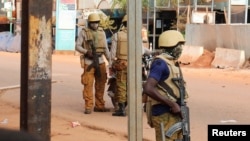2024 saw Africa deepen its ties with Russia, as more countries broke their Western partnerships, expelled troops, fined and delicensed businesses involved in exploiting natural resources, CNN reported on Jan. 18.
Most Sahel nations changed their foreign policy priorities after coups that brought Kremlin-loyalist juntas to power. Experts dubbed those countries a “coup belt.” Among others, that belt includes Burkina Faso.
Russia and the juntas frame the anti-West glissade as a start of decolonization processes leading to true sovereignty and prosperity.
On social media, junta-sympathetic influencers amplify the Kremlin’s narrative.
One example is African Hub, a content creator on social media platform X with more than 800,000 followers, which regularly praises Burkina Faso’s junta leader Ibrahim Traore.
“Burkina Faso dropped French as their official language. Removed French colonial ruler’s name from streets. Banned Colonial era Barrister Wigs,” the user posted on X on January 14. The post claimed that Burkina Faso:
“Paid off debt to the west & has control over resources.”
The claim is misleading.
Burkina Faso has an outstanding external debt of at least $10 billion. As of January, Burkina Faso owed the International Monetary Fund, IMF, $328,394,000 after repaying $1.8 million the previous year.
The Sahelian nation ranked 182 out of 185 poorest countries in the world by the United Nations and is one of several developing countries that owe large loans to China. Neither Beijing nor Ouagadougou disclosed the amount of the loans.
The U.S.-based Boston University Global Development Policy reported that in September 2023, though, Burkina Faso borrowed $49 million from China for a Donsin Solar Power Plant energy project.
In 2019 and 2020, China loaned Burkina Faso $157 million for the National Backbone and SMART Burkina projects involving information and communication technology advancement.
There is no information to show that Burkina Faso paid off any of its Chinese debts.
Various social media users claimed the junta also has paid off domestic debt of $4.7 billion. They provided no evidence to verify those claims.
The African Hub's claim that the West African nation has reclaimed its natural resources from international companies is also misleading.
Since Captain Ibrahim Traore seized power through a coup in September 2022, he has been expelling Burkina Faso's former colonial master, the French, and replacing it with Russia in various "interests,” mainly in exploiting the natural resources.
Burkina Faso currently has 17 industrial gold mines that produce about 70 tons of gold annually. Last year, Traore said he was planning to “withdraw mining permits from some foreign companies and will seek to produce more of its gold.”
Burkina Faso’s parliament passed a new mining code in July that “aims to boost local participation and State oversight in mining, replacing the 2015 Mining Code for new permits.”
Foreign companies, however, continue to dominate the gold mining industry in Burkina Faso.
One Russian company, a U.S.-sanctioned Nordgold, operates at least four large mines. Nordgold provides gold to the Kremlin to buy weapons from China and Iran, the U.S. said. The U.S. Treasury Department sanctioned Nordgold in 2022 because it is owned or controlled by Alexey Mordashov, a leader of Severgroup, a multi-billion-dollar Russian investment company “bankrolling the Kremlin's war in Ukraine.”
Traore, a self-declared loyalist of Russia’s President Vladimir Putin, continues prolonging contracts and easing the environment for Russian businesses, including by significantly reducing taxes.
Endeavor, a company registered in Britain, operates two mines in Burkina Faso, the Hounde mine and the Mana mine, in the country’s north.
At the end of 2024, the junta struck a deal with Endeavour to nationalize the Boungou and Wahgnion gold mines for about $80 million, using Lilium mining company, which was acquiring the mines from Endeavor for $300 million.
Canadian companies, which have been dominating Burkina Faso’s mining industry for decades, said no intention of withdrawing mining permits, after Traore’s warning.
A Canadian Iamgold Essakane mining company operates the Essakane Gold Mine in Falagountou, northern Burkina Faso. It owns 90% of the stake, with the Burkina Faso government owning the remaining 10%.
There also is a Canadian Fortuna Silver Mines Inc. that operates several gold mines in Burkina Faso.
And Canadian company Orezone owns 90% interest in the Bombore Gold Mine with the government of Burkina Faso retaining a 10% carried interest.
Australian gold miner Sarama Resources is locked in a legal battle with Burkina Faso. The company is demanding $115 million in damages after the junta withdrew its 12-year-old exploration license.





